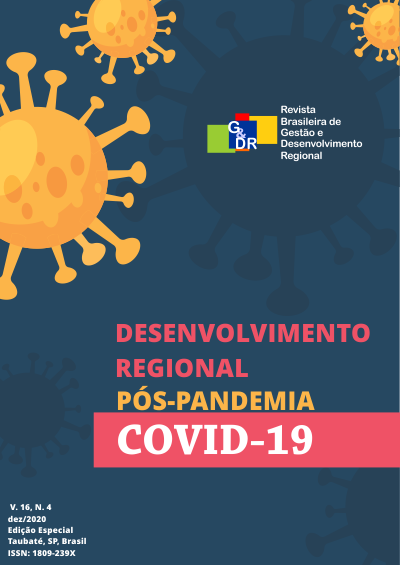THE ROLE OF STATE IN THE COVID-19 PANDEMIC CRISIS MANAGEMENT: DIFFERENT VIEWS ABOUT FEDERALISM AND THE RELATIONS BETWEEN FEDERAL GOVERNMENT AND MUNICIPALITIES
Keywords:
COVID-19. Federalism. Health Management. Municipalities. Public Policies.Abstract
The COVID-19 pandemic was able to bring up thoughts and doubts about State capacity to manage the crisis in Brazil. This paper explores some aspects of federative articulations between the Federal Government and municipalities to manage the Public Health emergency. The theoretical-methodological approach was a longitudinal design, identifying the steps in a process and their impacts on the studied phenomenon, starting from a documental analysis and a non-systematic review. Two primary axes guided this text: i) the decentralization process in the health system in Brazil and their implications on the subnational management capacity, and ii) the Federal level coordination as the main element to manage the public responses. The COVID-19 pandemic in Bolsonaro's presidency is analyzed, in a third moment, as the "arrival point" of a mismatch between Bolsonaro's-federalism institutional design and the proposed 1988 Federal Constitution's cooperative model. Even on an exploratory level of results, it is possible to assert that a series of events since municipal public management decentralization to the Bolsonaro's-federalism model could be, among other factors, able to explain the national mismatch and discoordination to respond to the COVID-19 pandemic in Brazil. Besides that, it is also possible to think about the need for new studies focused on analyzing this series of events, considering an institutional logic under implementation by populists' governmentsDownloads
Published
2020-12-15
How to Cite
Censon, D., & Barcelos, M. (2020). THE ROLE OF STATE IN THE COVID-19 PANDEMIC CRISIS MANAGEMENT: DIFFERENT VIEWS ABOUT FEDERALISM AND THE RELATIONS BETWEEN FEDERAL GOVERNMENT AND MUNICIPALITIES. Revista Brasileira De Gestão E Desenvolvimento Regional, 16(4). Retrieved from https://www.rbgdr.com.br/revista/index.php/rbgdr/article/view/5977
Issue
Section
Artigos
License
Authors who have their papers accepted and published in the Brazilian Journal of Regional Management and Development must agree to the copyright policy CC BY https://creativecommons.org/licenses/by/4.0/.
If the article is accepted for publication, the copyright is automatically assigned to the Brazilian Journal of Regional Management and Development.
















